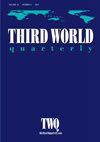Inclusive informal-to-informal trade: the poverty alleviation potential of street vendors’ trade networks in Santiago de Chile
IF 1.8
2区 经济学
Q2 DEVELOPMENT STUDIES
引用次数: 0
Abstract
Abstract The economic inclusion benefits of trade integration between formal and informal markets constitute an increasingly important debate in development studies, especially regarding poverty reduction. Recent international development efforts focus on strengthening informal-to-formal (I2F) links as a win-win developmental strategy to eradicate poverty, while building upon informal-to-informal (I2I) trade relations are seen to preserve poverty. Nevertheless, research comparing these approaches is scarce. This article compares street market vendors’ integration into I2F and I2I trading links, assessing their associated economic benefits and market power dynamics. Using mixed methods, we empirically test theoretical hypotheses on a representative sample of Santiago de Chile’s street market vendors and follow the trade networks of branded and unbranded street market products through 50 in-depth interviews. The results suggest that street vendors’ I2I trade can constitute a highly specialised, structured and nationwide trade network that can rival the poverty alleviation potential of I2F trade networks. Compared with I2F trade links, I2I networks reduce opportunities for exploitation and allow street vendors to obtain higher income. Consequently, building a more robust articulation of street vendors and informal firms into trade networks merits more attention in development studies as a potential alternative to I2F strategies when fostering street vendors’ economic inclusion.包容性非正式对非正式贸易:智利圣地亚哥街头摊贩贸易网络的减贫潜力
摘要在发展研究中,特别是在减贫方面,正式市场和非正规市场之间贸易一体化的经济包容性益处构成了一个越来越重要的辩论。最近的国际发展努力侧重于加强非正式到正式的联系,将其作为消除贫困的双赢发展战略,同时建立非正式到非正式的贸易关系被视为保护贫困。然而,比较这些方法的研究很少。本文比较了街头市场供应商融入I2F和I2I交易环节的情况,评估了其相关的经济效益和市场力量动态。使用混合方法,我们在智利圣地亚哥街头市场供应商的代表性样本上实证检验了理论假设,并通过50次深入访谈跟踪了品牌和非品牌街头市场产品的贸易网络。结果表明,街头小贩的I2I贸易可以构成一个高度专业化、结构化和全国性的贸易网络,可以与I2F贸易网络的扶贫潜力相媲美。与I2F贸易链路相比,I2I网络减少了剥削机会,并使街头小贩获得了更高的收入。因此,在发展研究中,将街头小贩和非正规企业更有力地纳入贸易网络,作为促进街头小贩经济包容性的I2F战略的潜在替代方案,值得更多关注。
本文章由计算机程序翻译,如有差异,请以英文原文为准。
求助全文
约1分钟内获得全文
求助全文
来源期刊

Third World Quarterly
DEVELOPMENT STUDIES-
CiteScore
4.10
自引率
15.00%
发文量
137
期刊介绍:
Third World Quarterly ( TWQ ) is the leading journal of scholarship and policy in the field of international studies. For almost four decades it has set the agenda of the global debate on development discourses. As the most influential academic journal covering the emerging worlds, TWQ is at the forefront of analysis and commentary on fundamental issues of global concern. TWQ examines all the issues that affect the many Third Worlds and is not averse to publishing provocative and exploratory articles, especially if they have the merit of opening up emerging areas of research that have not been given sufficient attention. TWQ is a peer-reviewed journal that looks beyond strict "development studies", providing an alternative and over-arching reflective analysis of micro-economic and grassroot efforts of development practitioners and planners. It furnishes expert insight into crucial issues before they impinge upon global media attention. TWQ acts as an almanac linking the academic terrains of the various contemporary area studies - African, Asian, Latin American and Middle Eastern - in an interdisciplinary manner with the publication of informative, innovative and investigative articles. Contributions are rigorously assessed by regional experts.
 求助内容:
求助内容: 应助结果提醒方式:
应助结果提醒方式:


